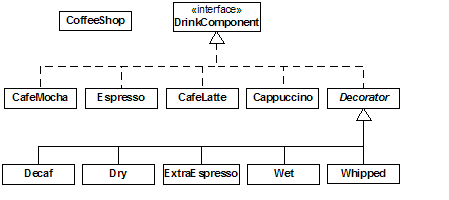SpecialistOff.NET / Вопросы / Статьи / Фрагменты кода / Резюме / Метки / Помощь / Файлы
НазадCompromise
Метки: python
The previous approach takes too long to describe a coffee. There will also be certain combinations that you will describe regularly, and it would be convenient to have a quick way of describing them.
The 3rd approach is a mixture of the first 2 approaches, and combines flexibility with ease of use. This compromise is achieved by creating a reasonably sized menu of basic selections, which would often work exactly as they are, but if you wanted to decorate them (whipped cream, decaf etc.) then you would use decorators to make the modifications. This is the type of menu you are presented with in most coffee shops.

Here is how to create a basic selection, as well as a decorated selection:
# Decorator/compromise/CoffeeShop.py
# Coffee example with a compromise of basic
# combinations and decorators
class DrinkComponent:
def getDescription(self):
return self.__class__.__name__
def getTotalCost(self):
return self.__class__.cost
class Espresso(DrinkComponent):
cost = 0.75
class EspressoConPanna(DrinkComponent):
cost = 1.0
class Cappuccino(DrinkComponent):
cost = 1.0
class CafeLatte(DrinkComponent):
cost = 1.0
class CafeMocha(DrinkComponent):
cost = 1.25
class Decorator(DrinkComponent):
def __init__(self, drinkComponent):
self.component = drinkComponent
def getTotalCost(self):
return self.component.getTotalCost() + \
DrinkComponent.getTotalCost(self)
def getDescription(self):
return self.component.getDescription() + \
' ' + DrinkComponent.getDescription(self)
class ExtraEspresso(Decorator):
cost = 0.75
def __init__(self, drinkComponent):
Decorator.__init__(self, drinkComponent)
class Whipped(Decorator):
cost = 0.50
def __init__(self, drinkComponent):
Decorator.__init__(self, drinkComponent)
class Decaf(Decorator):
cost = 0.0
def __init__(self, drinkComponent):
Decorator.__init__(self, drinkComponent)
class Dry(Decorator):
cost = 0.0
def __init__(self, drinkComponent):
Decorator.__init__(self, drinkComponent)
class Wet(Decorator):
cost = 0.0
def __init__(self, drinkComponent):
Decorator.__init__(self, drinkComponent)
cappuccino = Cappuccino()
print(cappuccino.getDescription() + ": $" + \)
`cappuccino.getTotalCost()`
cafeMocha = Whipped(Decaf(CafeMocha()))
print(cafeMocha.getDescription() + ": $" + \)
`cafeMocha.getTotalCost()`
You can see that creating a basic selection is quick and easy, which makes sense since they will be described regularly. Describing a decorated drink is more work than when using a class per combination, but clearly less work than when only using decorators.
The final result is not too many classes, but not too many decorators either. Most of the time it’s possible to get away without using any decorators at all, so we have the benefits of both approaches.